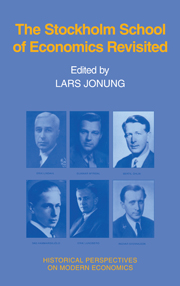Book contents
- Frontmatter
- Dedication
- Contents
- Preface
- List of Contributors
- Dramatis Personae at the end of 1937
- Introduction and Summary
- Part I The roots
- Part II The approach of the Stockholm School
- 4 Expectation and plan: The microeconomics of the Stockholm School
- 5 Sequence analysis and optimization
- 6 There were two Stockholm Schools
- 7 On formal dynamics: From Lundberg to chaos analysis
- 8 Lundberg, Keynes, and the riddles of a general theory
- 9 Macrodynamics and the Stockholm School
- 10 Ohlin and the General Theory
- 11 The monetary economics of the Stockholm School
- 12 The Austrians and the Stockholm School: Two failures in the development of modern macroeconomics?
- 13 The political arithmetics of the Stockholm School
- 14 After the Stockholm School
- Comment
- Comment
- Part III The impact of the Stockholm School
- Part IV What remains of the Stockholm School?
- The Stockholm School: A non-Swedish bibliography
Comment
Published online by Cambridge University Press: 05 July 2013
- Frontmatter
- Dedication
- Contents
- Preface
- List of Contributors
- Dramatis Personae at the end of 1937
- Introduction and Summary
- Part I The roots
- Part II The approach of the Stockholm School
- 4 Expectation and plan: The microeconomics of the Stockholm School
- 5 Sequence analysis and optimization
- 6 There were two Stockholm Schools
- 7 On formal dynamics: From Lundberg to chaos analysis
- 8 Lundberg, Keynes, and the riddles of a general theory
- 9 Macrodynamics and the Stockholm School
- 10 Ohlin and the General Theory
- 11 The monetary economics of the Stockholm School
- 12 The Austrians and the Stockholm School: Two failures in the development of modern macroeconomics?
- 13 The political arithmetics of the Stockholm School
- 14 After the Stockholm School
- Comment
- Comment
- Part III The impact of the Stockholm School
- Part IV What remains of the Stockholm School?
- The Stockholm School: A non-Swedish bibliography
Summary
The Stockholm School set out to perform a very ambitious dynamic macroanalysis, their so-called sequence analysis. However, the school was faced with a number of problems since it lacked the necessary tools for such analysis. Let me mention some of these problems.
Expectations and expectations formation were crucial for the dynamic method, but the Stockholm School did not have a theory of expectations. The participants of the School instead assumed arbitrarily given expectations. The exception was that of Lindahl's self-fulfilled expectations in a deterministic framework, that is, the assumption of perfect foresight in an intertemporal general equilibrium setup.
The Stockholm School also suffered from having insufficient microfoundations for its behavioral assumptions. They either lacked the capacity or the desire to provide such microfoundations. Instead they assumed rather arbitrarily given response functions. Lindahl assumed, for instance, that when expectations were fulfilled, ex ante plans for the next period were a function of ex post realizations of the current period. Lundberg assumed, for instance, that investment was a given function of current profits, regardless of whether or not expectations were fulfilled. These arbitrary assumptions led to arbitrary conclusions, what David Laidler calls a bewildering variety of possible outcomes depending upon the specific set of assumptions made.
- Type
- Chapter
- Information
- The Stockholm School of Economics Revisited , pp. 364 - 366Publisher: Cambridge University PressPrint publication year: 1991



